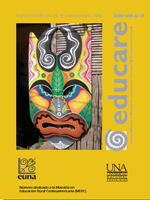Las tecnologías de información y comunicación (TIC) desde una perspectiva social
DOI:
https://doi.org/10.15359/ree.12-Ext.13Keywords:
technology, development, social developmentAbstract
The intention of the article is to announce the needs of a curriculum Identified in the NicaraguanThis article analyses the potential of information and communication technologies from a rural social context approach. The author approaches the advantages of the social incorporation of this resource, its menaces and risks as well as the aspects that have to be valued when an impact on social development is expected. This perspective allows tackling the relation between ICTs and social concerns such as social inequality, gender equity, and community participation, among others. The article ends up presenting a reflection about some challenges in this matter.
References
Daccach, J. C. (s. f.). Tecnologías de la Información y Comunicaciones (TIC). Consultado el 12 de
junio de 2007 de http://www.gestiopolis.com/delta/term/TER434.html
Wikipedia La Enciclopedia Libre. (s.f.). Tecnologías de información y comunicación. Concepto.
Consultado el 12 de junio de 2007 de http://es.wikipedia.org/wiki/Tecnolog%C3%ADas_de_
la_informaci%C3%B3n
Downloads
Published
How to Cite
Issue
Section
License
1. In case the submitted paper is accepted for publication, the author(s) FREELY, COSTLESS, EXCLUSIVELY AND FOR AN INDEFINITE TERM transfer copyrights and patrimonial rights to Universidad Nacional (UNA, Costa Rica). For more details check the Originality Statement and Copyright Transfer Agreement
2. REUTILIZATION RIGHTS: UNA authorizes authors to use, for any purpose (among them selfarchiving or autoarchiving) and to publish in the Internet in any electronic site, the paper´'s final version, both approved and published (post print), as long as it is done with a non commercial purpose, does not generate derivates without previous consentment and recognizes both publisher's name and authorship.
3. The submission and possible publication of the paper in the Educare Electronic Journal is ruled by the Journal’s editorial policies, the institutional rules of Universidad Nacional and the laws of the Republic of Costa Rica. Additionally, any possible difference of opinion or future dispute shall be settled in accordance with the mechanisms of Alternative Dispute Resolution and the Costa Rican Jurisdiction.
4. In all cases, it is understood that the opinions issued are those of the authors and do not necessarily reflect the position and opinion of Educare, CIDE or Universidad Nacional, Costa Rica. It is also understood that, in the exercise of academic freedom, the authors have carried out a rogorous scientific-academic process of research, reflection and argumentation thar lays within the thematic scope of interest of the Journal.
5. The papers published by Educare Electronic Journal use a Creative Commons License:














 The articles published by Educare Electronic Journal can be shared with a Creative Commons License:
The articles published by Educare Electronic Journal can be shared with a Creative Commons License: 



